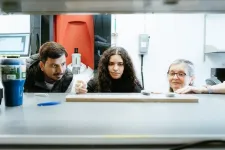(Press-News.org) ‘Good’ (HDL) cholesterol, usually considered to be beneficial for health, may be linked to a heightened risk of the serious eye condition, glaucoma—at least among the over 55s— suggest the results of a large observational study, published online in the British Journal of Ophthalmology.
Paradoxically, ‘bad’ (LDL) cholesterol, usually regarded as harmful to health, may be associated with a lower risk of glaucoma, a condition that damages the optic nerve, potentially leading to irreversible sight loss or total blindness.
The findings challenge received wisdom about what may help and hinder eye health, and suggest that a rethink may be needed of how patients with high blood fats and who are at risk of glaucoma, are treated, say the researchers.
Glaucoma is projected to affect around 112 million people by 2040. Risk factors include age, ethnicity, the build-up of pressure within the eye (IOP), and family history, explain the researchers.
Abnormally high levels of circulating fats (lipids) in the bloodstream have been linked to eye conditions, such as macular degeneration and diabetic retinopathy. Recently published research has also implied a link with glaucoma, but the findings have been inconsistent, and it’s not clear which type of lipid might be most influential, they add.
To strengthen the evidence base, the researchers drew on 400,229 participants aged 40 to 69 in the UK Biobank Study. They had all filled in a questionnaire, been interviewed, and had undergone a standard panel of blood tests, including those to measure blood fats.
Their health was tracked for an average of 14 years, during which time 6868 (nearly 2%) of them developed glaucoma.
Compared with participants who didn’t develop glaucoma, those who did, tended to be older, and of non-White ethnicity. They had higher HDL, but lower LDL, cholesterol and a higher waist-to-hip ratio (indicative of central obesity).
They were also more likely to be ex-smokers, and to be taking statins, and they had a higher prevalence of diabetes, high blood pressure, and cardiovascular disease.
But analysis of the blood test results showed that higher levels of ‘good’ HDL cholesterol were associated with a heightened risk of glaucoma while higher levels of ‘bad’ LDL cholesterol, total cholesterol, and triglycerides were associated with a lower risk.
Those with the highest level of HDL cholesterol in their bloodstream were 10% more likely to develop glaucoma than those with the lowest level, with every (standard deviation) increase associated with a 5% higher risk.
Similarly, participants with the highest levels of LDL cholesterol and triglycerides were 8% and 14%, respectively, less likely to develop glaucoma than those with the lowest levels.
And each (standard deviation) increase in LDL cholesterol, total cholesterol, and triglycerides lowered the risks by 4%, 3%, and 4%, respectively.
But these observed associations only persisted among those older than 55, with no significant association seen in those aged 40–55; the findings were also influenced by sex and type of glaucoma.
The researchers drew up a polygenic risk score—a number that provides a personalised measure of genetic susceptibility to diseases by combining genetic risk information from across the genome.
This showed that each additional genetic risk was associated with 5% higher odds of developing glaucoma. But there were no significant individual associations between LDL cholesterol, total cholesterol, or triglycerides and glaucoma.
This is an observational study, and as such, no firm conclusions can be drawn about cause and effect. And the researchers acknowledge various limitations to their findings, including that blood samples weren’t taken after fasting and only at a single time point.
The findings might also not be applicable to other ethnic groups, as UK Biobank participants are predominantly of European ancestry.
But they suggest: “These findings challenge existing paradigms about ‘good’ and ‘bad’ cholesterol in relation to eye health. This could prompt a re-evaluation of lipid management strategies in patients at risk for glaucoma.”
And they conclude: “HDL cholesterol has been regarded as the ‘good cholesterol’ for seven decades. However, this study demonstrates that high levels of [it] are not consistently associated with a favourable prognostic outcome. Further studies are needed to investigate the mechanisms behind these associations.”
END
‘Good’ cholesterol may be linked to heightened glaucoma risk among over 55s
….while paradoxically ‘bad’ cholesterol may be linked to a lower risk Findings challenge received wisdom about what may help and hinder eye health, say researchers
2025-02-05
ELSE PRESS RELEASES FROM THIS DATE:
GLP-1 drug shows little benefit for people with Parkinson’s disease
2025-02-05
The GLP-1 drug, exenatide, has no positive impact on the movement, symptoms or brain imaging of people with Parkinson’s, finds a new study led by UCL researchers.
The world’s largest and longest trial of exenatide in people with Parkinson’s disease was funded by the National Institute for Health & Care Research (NIHR) with support for sub-studies from Cure Parkinson’s and Van Andel Institute.
For their research, published in The Lancet, the team designed a randomised controlled phase 3 trial to definitively determine whether exenatide use was associated with any benefit in people with Parkinson’s and ...
Generally, things really do seem better in morning, large study suggests
2025-02-05
Generally, things really do seem better in the morning, with clear differences in self-reported mental health and wellbeing across the day, suggest the findings of a large study published in the open access journal BMJ Mental Health.
People generally wake up feeling in the best frame of mind in the morning but in the worst around midnight, the findings indicate, with day of the week and season of the year also playing their part.
Mental health and wellbeing are dynamic in nature, and subject to change over both short and extended periods, note the researchers. But relatively few studies have looked at how these might change over the course of the day, and those studies that ...
Juicing may harm your health in just three days, new study finds
2025-02-04
“Most people think of juicing as a healthy cleanse, but this study offers a reality check”
CHICAGO --- Think your juice cleanse is making you healthier? A new Northwestern University study suggests it might be doing the opposite. The study, recently published in Nutrients, found that a vegetable and fruit juice-only diet — even for just three days — can trigger shifts in gut and oral bacteria linked to inflammation and cognitive decline.
How was the study conducted?
Northwestern scientists studied three groups of healthy adults. One group consumed only juice, another had juice with whole ...
Forest landowner motivation to control invasive species depends on land use, study shows
2025-02-04
URBANA, Ill. – Many U.S. forests are privately owned, particularly in the Eastern and North Central part of the country. This makes control of invasive plants and pests challenging because efforts must be coordinated across landowners. A new study from the University of Illinois Urbana-Champaign explores how differences in ownership motivation affects willingness to control, and how economic incentives can be implemented most efficiently.
“Some own the land for recreational purposes, some own it because they want to produce timber, and some are a combination of both. If one landowner controls invasive species ...
Coal emissions cost India millions in crop damages
2025-02-04
In many parts of India, a single noxious pollutant from coal-fired power stations drags down annual wheat and rice yields by 10% or more, according to a new study by Stanford Doerr School of Sustainability researchers.
The two grains are critical for food security in India, the second most populous country in the world and home to a quarter of all undernourished people globally.
“We wanted to understand the impact of India’s coal electricity emissions on its agriculture because there might be ...
$10.8 million award funds USC-led clinical trial to improve hip fracture outcomes
2025-02-04
The University of Southern California has been approved for $10.8 million in research funding by the Patient-Centered Outcomes Research Institute (PCORI) to compare approaches to treating older adults with a fracture of the hip. Led by principal investigator Joseph Patterson, MD, an orthopaedic surgeon specializing in fracture care at Keck Medicine of USC, the “FASTER-Hip” trial aims to determine whether patients with a certain type of hip fracture fare better with a hip replacement or a simpler surgery known as internal fixation.
The trial leadership team includes ...
University Hospitals Cleveland Medical Center among most reputable academic medical centers
2025-02-04
CLEVELAND -- University Hospitals Cleveland Medical Center is one of the most recognizable hospitals among doctors in the U.S. and around the world, according to an annual survey.
UH Cleveland Medical Center was ranked eighth in the U.S. and 16th globally in a survey of the strongest Academic Medical Center brands, according to Brand Finance, a London-based brand valuation consultancy.
“This ranking is a reflection of all we do at University Hospitals to provide compassionate care for patients, work to find the next generation of therapies and treatments, invest ...
Emilia Morosan on team awarded Kavli Foundation grant for quantum geometry-enabled superconductivity
2025-02-04
Rice University physicist Emilia Morosan is part of an international research collaboration that has been awarded multimillion-dollar funding from The Kavli Foundation to develop and test next-generation superconductors through artificial intelligence and quantum geometry. This global initiative, spearheaded by Päivi Törmä of Aalto University in Finland, seeks to push the boundaries of quantum materials science and superconductivity.
The project includes funding from the Klaus ...
Unlock sales growth: Implement “buy now, pay later” to increase customer spending
2025-02-04
Researchers from Imperial College Business School and University of Leeds published a Journal of Marketing study that examines the impact of BNPL installment payments on retail sales. The study, forthcoming in the Journal of Marketing, is titled “Buy Now Pay Later: Impact of Installment Payments on Customer Purchases” and is authored by Stijn Maesen and Dionysius Ang.
Buy-Now-Pay-Later (BNPL) is an increasingly popular payment method, allowing customers to spread payment into interest-free installments over a few weeks or months. Worldwide ...
Research team could redefine biomedical research
2025-02-04
Professor Leslie Wolf, a Distinguished University Professor and Ben F. Johnson Jr. Chair in Law at Georgia State University College of Law, is a part of a research team that has been provided $1.9 million to conduct research designed to increase participation in biomedical studies by involving participants in the research design process. The award has been approved pending completion of a business and programmatic review by PCORI staff and issuance of a formal award contract.
Wolf, along with colleagues at the ...
LAST 30 PRESS RELEASES:
Ten-point plan to deliver climate education unveiled by experts
Team led by UC San Diego researchers selected for prestigious global cancer prize
Study: Reported crop yield gains from breeding may be overstated
Stem cells from human baby teeth show promise for treating cerebral palsy
Chimps’ love for crystals could help us understand our own ancestors’ fascination with these stones
Vaginal estrogen therapy not linked to cancer recurrence in survivors of endometrial cancer
How estrogen helps protect women from high blood pressure
Breaking the efficiency barrier: Researchers propose multi-stage solar system to harness the full spectrum
A new name, a new beginning: Building a green energy future together
From algorithms to atoms: How artificial intelligence is accelerating the discovery of next-generation energy materials
Loneliness linked to fear of embarrassment: teen research
New MOH–NUS Fellowship launched to strengthen everyday ethics in Singapore’s healthcare sector
Sungkyunkwan University researchers develop next-generation transparent electrode without rare metal indium
What's going on inside quantum computers?: New method simplifies process tomography
This ancient plant-eater had a twisted jaw and sideways-facing teeth
Jackdaw chicks listen to adults to learn about predators
Toxic algal bloom has taken a heavy toll on mental health
Beyond silicon: SKKU team presents Indium Selenide roadmap for ultra-low-power AI and quantum computing
Sugar comforts newborn babies during painful procedures
Pollen exposure linked to poorer exam results taken at the end of secondary school
7 hours 18 mins may be optimal sleep length for avoiding type 2 diabetes precursor
Around 6 deaths a year linked to clubbing in the UK
Children’s development set back years by Covid lockdowns, study reveals
Four decades of data give unique insight into the Sun’s inner life
Urban trees can absorb more CO₂ than cars emit during summer
Fund for Science and Technology awards $15 million to Scripps Oceanography
New NIH grant advances Lupus protein research
New farm-scale biochar system could cut agricultural emissions by 75 percent while removing carbon from the atmosphere
From herbal waste to high performance clean water material: Turning traditional medicine residues into powerful biochar
New sulfur-iron biochar shows powerful ability to lock up arsenic and cadmium in contaminated soils
[Press-News.org] ‘Good’ cholesterol may be linked to heightened glaucoma risk among over 55s….while paradoxically ‘bad’ cholesterol may be linked to a lower risk Findings challenge received wisdom about what may help and hinder eye health, say researchers



